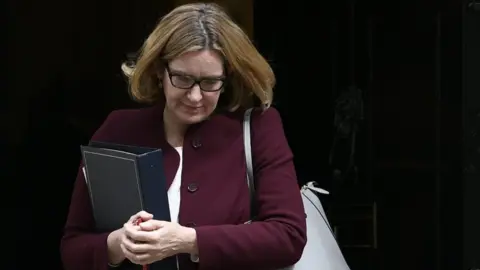Amber Rudd's exit gives Theresa May several headaches
 EPA
EPAWas Amber Rudd's resignation inevitable? Certainly there has been a mismatch between what she told MPs last week and the evidence that emerged.
In a different time, and with a minister with enemies, she'd most likely have been out on Friday.
This time the Tory party was fighting hard to keep her. But beyond the mess-ups, perhaps part of the issue was also that the home secretary was not necessarily in tune with her predecessor's attitude on immigration - the Home Office's most politically charged brief.
It is hard to understand that she wasn't aware of a widespread culture of targets. But no one is suggesting that she deliberately misled MPs last week.
So, it is pertinent to ask how much focus she gave to the immigration brief at the Home Office, or whether she was happy to delegate to trusted colleagues and focus on other areas.
Those who have worked at junior levels in the Home Office as ministers sometimes joke that they'd never want the big job given how complicated it is.
Home secretaries, however tightly they grip everything, can never be sure they won't trip up.
But don't forget Ms Rudd's persona was also vital in the delicate Brexit balance of the cabinet.
She was a Remainer, and trusted by the PM. A grown up, who was as open as politically possible about the case she would make for the softer end of Brexit privately, hinting at it in public too.
Given the fraught politics of the moment, replacing her is not just a matter of promoting a minister who looks competent, but making an appointment that does not tear the already strained Tory truce.
And beyond all that, Ms Rudd's departure gives Theresa May not one, but several new potential headaches.
It gives an impression of shaky government days before the local elections.
Ms Rudd could give the Tory rebel Remainers more authority on the backbenches. And continuing questions about the Windrush fiasco may now be aimed more sharply at the prime minister herself.
There are good reasons why Number 10 initially tried to resist this resignation.
The pressure on the individual may be gone, but the wider impact may not yet have begun. Stretching to close one gap opens another.
Ms Rudd was an important figure in cabinet, not just because she occupied one of the great offices of state, but because she was widely liked inside her party, at the more modern end of the Tory spectrum and a vigorous Remainer whose voice gave ballast to that side of the argument at the top table.
The decision to go was - I'm told - entirely hers. Both Number 10 and her other political friends in government tried to persuade her to stay, it's said.
It was her judgement that it was untenable to stay it's suggested, because she couldn't be sure that nothing else would emerge from the Home Office filing cabinets that might have made staying on in the job even more awkward than it already was.
